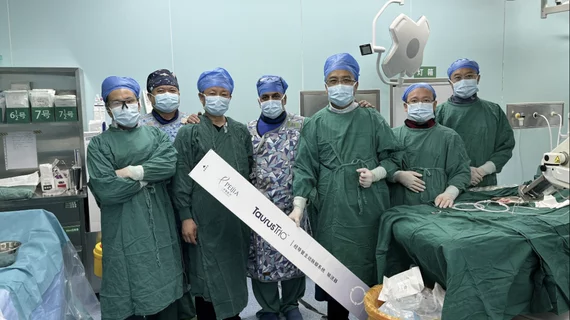Chinese made version of JenaValve TAVR device implanted in first patient
The first Chinese patient has been enrolled in a multicenter clinical trial for the TaurusTrio Transcatheter Aortic Valve Replacement (TAVR) System, the first domestically made Chinese TAVR device for aortic regurgitation (AR).
Vendor Peijia Medical is a player in the high-growth transcatheter valve and neurointerventional medical device markets in China. The TaurusTrio is a licensed version of the Trilogy Heart Valve System for AR from U.S.-based JenaValve Technology Inc.
The first implant was successfully completed by professors Yongjian Wu and Guangyuan Song at Beijing An Zhen Hospital, Capital Medical University, on July 26, 2023.
"We are pleased to have safely implanted the first patient in China with the TaurusTrio TAVR System," Dr. Yi Zhang, chief executive officer of Peijia Medical, said in a statement. "The trial reinforces our goals of improving care in the field of cardiology and expanding TAVR systems within China. We are looking forward to our continued partnership with American company JenaValve and presenting further data from the clinical trial at a future date."
The clinical trial of the TaurusTrio TAVR System is designed to assess the safety and efficacy of the device for treating patients with native symptomatic, severe AR, who are judged by a heart team to be at high or greater risk for surgical aortic valve replacement (SAVR). The result of this clinical trial would be included in the company's future submission of registration application to the National Medical Products Administration (NMPA).
As of now, no transfemoral TAVR system for AR has been approved by the NMPA in China. In June 2023, the TaurusTrio System was accepted by the special review and approval procedure for innovative medical devices by the NMPA, which is similar to the the U.S. FDA priority review and breakthrough device designation.
In January 2022, Peijia Medical obtained an exclusive license from JenaValve for developing, manufacturing and commercializing the Trilogy Heart Valve System in the greater China region. On May 12, the successful completion of the first two commercial implants with the Trilogy Heart Valve System took place in Hong Kong.
The JenaValve Trilogy TAVR device gained a European CE mark in 2013. JenaValve began its ALIGN-AR U.S. pivotal trial in 2020 and is seeking U.S. FDA premarket approval (PMA) for the device to treat AR. Enrollment in the trial was completed in 2022. Data from the trial was presented at the 2022 Transcatheter Cardiovascular Therapeutics (TCT) annual meeting.
Peijia Medical was established in 2012 and is headquartered in Suzhou, China. The company has focused on the high-growth interventional procedural medical device market in China and aims to become a leader in structural heart and neurovascular diseases. The company now has two generations of TAVR systems and 15 neurointerventional devices commercialized in China.

